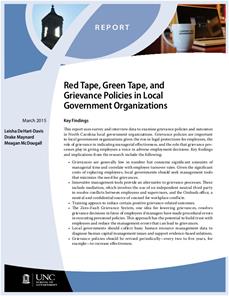
New research released by the Local Government Research Collaborative looks at the grievance process in local governments and improvements that could have a significant impact on organizational culture and productivity. In Red Tape to Green Tape, researcher Leisha DeHart-Davis, Ph.D., associate professor of public administration and government at UNC-Chapel Hill, looked at quantitative and qualitative data from North Carolina local government organizations to identify patterns of grievances, how grievance policies are designed, and whether there is any relationship between the design of grievance policies and their outcomes. The research also identifies managerial innovations with the potential to resolve conflicts and reduce employee grievances.
In a letter, DeHart-Davis suggested some changes government leaders could make to improve the grievance process:
- Update your organization’s grievance policy. It makes sense to update grievance policies every two to five years depending on changes in organization leadership, employment law, and workforce composition.
- Minimize employee grievances by making sure your organization has a functional performance appraisal system, an employee survey, and effective supervisory training.
- Create a human capital management dashboard that reports real-time data on turnover, terminations, suspensions, disciplinary actions, and grievances by department. This helps to identify human capital hotspots in need of managerial support.
- Conduct a green tape evaluation of your organization’s grievance process. The grievance process would be evaluated against the five green tape criteria for effective rules – the purpose and logic of the grievance process, the quality and clarity of written requirements, the level of control, the consistency of grievance process application, and the extent to which grievance processes were understood. Any weaknesses in these criteria would be flagged for action, whether through policy redesign, communication or training.
- Re-name your organization’s grievance process to an appeals process. “Appeal” is a less divisive and more neutral term than “grievance.”
About the Local Government Research Cooperative
In 2013, 21 local governments and three universities joined together with the Alliance for Innovation, ICMA, and the Center for Urban Innovation at Arizona State University to establish the Local Government Research Cooperative (LGRC). The LGRC is developing and funding an actionable research agenda that addresses significant issues confronting local governments.
New, Reduced Membership Dues
A new, reduced dues rate is available for CAOs/ACAOs, along with additional discounts for those in smaller communities, has been implemented. Learn more and be sure to join or renew today!
